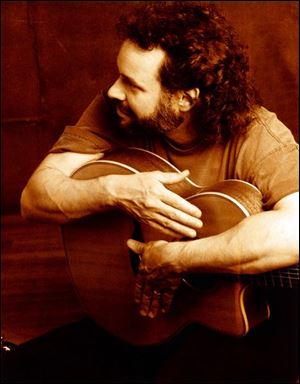
'Dark optimist' has keen eye
10/22/2004
John Gorka
John Gorka is a singer-songwriter with a rich baritone voice, a keen and observant eye, and the ability to describe people, places, and events with wit, wisdom, and humor.
But he's also a singer-songwriter who doesn't fit the usual folk, country, or pop formats.
"My songs are too long for the radio and not 'this enough' or 'that enough,'●" said Gorka, who will be at Owens Community College for a workshop and a concert tomorrow.
"But I think satellite radio is a hopeful place for my music on the radio and for music in general," Gorka said in an interview this week. "I think it is a place where there may be some innovative ways of reaching an audience. Conventional radio seems to be less and less accessible."
Born in Newark in 1958, Gorka started out playing five-string banjo in a "nontraditional" bluegrass band in Bethlehem, Pa., when he was a freshman studying philosophy and history at Moravian College.
"I loved the sound of the banjo. Earl Scruggs and Pete Seeger both had how-to-play books that were big influences," he said.
Noting that he just happened to be inspired by musicians "whose names started with the letter J," Gorka said his primary influences then were John Prine, Jim Croce, Janis Ian, Joni Mitchell, Judy Collins, and Joan Baez.
He soon moved from bluegrass to folk, performing on the Bethlehem coffeehouse scene and a folk club called Godfrey Daniels. He actually moved into the club's basement and served as the soundman, usher, and counter worker when he wasn't opening for such headliners as Nanci Griffith, Tom Paxton, Stan Rogers, and Eric Andersen.
"A lot of the people I opened shows for there in turn opened doors for me in other parts of the country," he said.
Gorka won the prestigious New Folk Award at the Kerrville Folk Festival in 1984 and began playing in Greenwich Village in the mid-1980s while still living in Pennsylvania's Lehigh Valley.
In New York, Gorka earned a spot among the top artists in Jack Hardy's Fast Folk circle, a renowned showcase for folk artists including Shawn Colvin, Dave Van Ronk, Christine Lavin, and Suzanne Vega.
"By the time we realized there was a 'scene,' it had already passed," Gorka said. Often described as a "dark optimist," Gorka said he believes that everything will work out fine, but only after he considers everything that could go wrong.
He signed with Red House Records, one of the top folk labels, and released his debut disc, "I Know," in September, 1987, before being recruited by Windham Hill founder Will Ackerman, who signed Gorka to his High Street Label in 1989.
Gorka released five critically acclaimed albums on High Street but returned to Red House in 1998, saying that he and the label had the same priorities: "Red House is in it first for the music, and so am I."
Among his most recent releases are "Old Futures Gone," released in 2003, and "The Company You Keep," a 2001 recording that featured guest appearances by Ani DiFranco, Mary Chapin Carpenter, and Tracy Chapman.
Gorka's songs have been recorded by such artists as Carpenter, Mary Black, and Maura O'Connell. Rolling Stone magazine called him "the pre-eminent male singer-songwriter of the new folk movement."
He said his next recording will feature original compositions and although he has some ideas for future projects, he said "their course is determined by the material, from the inside out, rather than any grand scheme I may try to impose upon them from without."
John Gorka will perform at 8 p.m tomorrow in the Center for Fine and Performing Arts at Owens Community College. Tickets are $8 for students and $16 for the general public from the box office, 567-661-2787.
Contact David Yonke at:
dyonke@theblade.com or
419-724-6154.